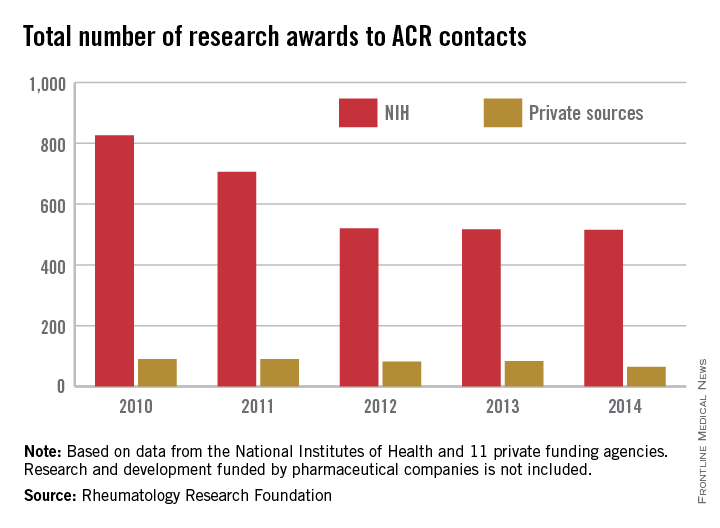The number of rheumatology research projects funded by the National Institutes of Health dropped by 52% from 2010 to 2014, while the number funded by private foundations fell by 29% over that period, according to data published by the Rheumatology Research Foundation (RRF).
In 2010, the NIH granted awards for 826 projects to “ACR contacts” – members of the American College of Rheumatology or the Association of Rheumatology Health Professionals, as well as individuals who had nonmember profiles within the ACR membership database. By 2014, that number was down to 515, a drop of 52%. In 2010, there were 90 awards granted by a group of 11 private foundations to ACR contacts, with the number of awards falling by 29% to 64 by 2014, the RRF reported.
In that same time period, NIH funding to ACR contacts dropped 41% from $1.16 billion to $686 million while investment by the private foundations – one of which was the RRF – dropped 34% from $20.7 million in 2010 to $13.6 million in 2014, the report showed. Research and development funded by pharmaceutical companies was not included.
Not surprisingly, federal research funding for conditions and diseases associated with rheumatology was mostly down from 2010 to 2014, although by varying degrees. Funding for osteoporosis dropped by 31%, while arthritis and lupus were both down about 22% and Lyme disease spending fell by almost 21%. Federal funding of autoimmune disease research was down by 16%, and research on aging was almost 14% lower. Funding was up for scleroderma (14%) and fibromyalgia (11%), although the total spending for these two areas was much lower than for the others, with 2014 scleroderma funding ($24 million) coming to about a tenth of that for arthritis ($239 million), the RRF reported.


